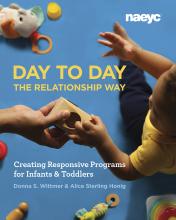Day to Day the Relationship Way: Creating Responsive Programs for Infants and Toddlers

About the Book
-
A focus on emotional and social development as the foundation for learning
-
Research findings that tie to everyday practice
-
Engaging vignettes and examples that bring relationship-based program elements to life
-
Links with the NAEYC Early Learning Program Accreditation Standards
Table of Contents
-
Introduction
- Relationship-Based, Responsive Programs for Infants and Toddlers
- Early Loving and Learning Experiences Matter
- Infants and Toddlers Need Loving, Consistent Relationships
- Caring, Responsive Adults Help Infants and Toddlers Thrive
- Children Deserve Respect as Persons with Feelings, Thoughts, and Rights
- Children Are Active, Capable Learners
- Successful Social and Emotional Development Are Critical to Learning
- Responsive Teachers Recognize the Uniqueness in Each Child
- Infants and Toddlers Live and Learn in Families and Communities
- Loving and Learning Occur Within a Context
- Your Work Is Both Joyful and Challenging
-
Part 1: Meeting Young Children’s Needs Through Strong Relationships
-
Chapter 1: Build Strong Relationships with Infants and Toddlers
- Mutually Rewarding Interactions
- Program Practices that Support Healthy Relationships
-
Chapter 2: Create Mutually Supportive Relationships with Families
- Create an Inclusive Environment for All Families
- Strategies for Communicating and Building Relationships with Families
- Challenges in Building Strong Relationships with Families
- Support Family–Child Relationships
-
Chapter 1: Build Strong Relationships with Infants and Toddlers
-
Part 2: How Infants and Toddlers Develop and Learn
-
Chapter 3: The Wonder of Learning to “Be”: Emotional Development and the Self
- Developing Attachments to Important Adults
- Gaining a Sense of Self, Self-Worth, and Self-Confidence
- Learning How to Understand and Express Emotions in Healthy Ways
- Beginning to Learn How to Self-Regulate
- Emotional Challenges: Stranger and Separation Anxiety
-
Chapter 4: The Wonder of Belonging and Becoming Social with Peers
- Developing a Sense of Belonging
- Learning How to Be with Peers and Develop Friendships
- Becoming Prosocial
- Facilitating Prosocial Development
- Helping Children Negotiate Conflicts
- Social Challenges: Peer Rejection, Withdrawal, and Aggression
-
Chapter 5: The Wonder of Learning to Communicate
- Developing Receptive Language Skills
- Learning Expressive Language Skills
- Learning Two or More Languages
- Facilitating Children’s Language Development
- Language and Communication Challenges
-
Chapter 6: The Wonder of Thinking and Learning
- Approaches to Learning
- Imitating to Learn and Build Relationships
- Developing Executive Functioning
- What Infants and Toddlers Are Learning
- Facilitating Cognitive Development
- Cognitive Challenges
-
Chapter 7: The Wonder of Learning to Move Successfully
- Developing Fine Motor Skills
- Developing Large Motor Skills
- Learning Balance and Coordination
- Gaining Sensory Skills
- Facilitating Motor Development
- Sensory Challenges
-
Chapter 3: The Wonder of Learning to “Be”: Emotional Development and the Self
-
Part 3: Developing a Responsive, Relationship-Based Program
-
Chapter 8: A Responsive, Relationship-Based Teacher
- Be a Reflective Practitioner
- Be a Responsive Facilitator of Learning
- Be a Keeper of the Spirit of the Child
-
Chapter 9: Responsive, Relationship-Based Environments
- Support Optimal Teacher–Child and Child–Child Relationships
- Provide Attractive, Engaging, and Calming Learning Environments
- Consider Age, Individuals, and Culture
- Define Learning Areas
- Provide Many Opportunities to Learn
- Create Opportunities for the Unexpected
- Support Respectful Relationships with the Environment
- Create a Welcoming Environment for Families
-
Chapter 10: Routines and Relationships
- Develop Relationships Through Responsive Routines
- Create a Thoughtful Schedule of the Day
- Guide Transitions Throughout the Day
-
Chapter 11: Creating Responsive Learning Opportunities
- Observe and Document Children’s Interests and Learning
- Use Observation to Plan a Responsive Curriculum
- Recognize the Potential in Each Activity, Action, Toy, and Piece of Equipment
- Find Resources for Activities, Materials, and Environments
- Reflect to Understand How Your Curriculum Is Working
-
Chapter 12: More Curriculum Ideas: Singing, Music, and Reading
- Sing to and with Children
- Listen to Music and Introduce Musical Instruments
- Read to and with Children
- Engage Older Infants and Toddlers in Small Informal Group Times
- Alphabet Whizzes?
-
Chapter 13: Adult Positive Guidance and Children’s Relationship Challenges
- Use Guidance Strategies
- Understand Emotional and Behavioral Challenges
- Use a Problem-Solving Approach and Partner with Families
- If Families Use Physical Punishment
- If Infants and Toddlers Feel Severely Challenged, Help Them Now!
- Children Who Experience Abuse and Other Traumas
-
Chapter 8: A Responsive, Relationship-Based Teacher
-
Part 4: You as a Professional
-
Chapter 14: A Relationship-Based Profession
- Power to the Profession
- Professionals Engage in Ethical Practice
- You and Your Well-Being
-
Chapter 14: A Relationship-Based Profession
- Appendix
- References
- Acknowledgments
- About the Authors
Book Details
ISBN: 978-1-938113-55-0
Publish Date: 2020
Related Resources
Articles
"Empowering Infants' and Toddlers' Learning Through Scaffolding" - Linda Groves Gillespie and Jan D. Greenberg explore how educators of young children can tap into the many opportunities to scaffold learning through everyday interactions. (Young Children, May 2017)
"Respect: The Heart of Serving Infants and Toddlers" - In this article, Toni Christie discusses the importance of creating settings that are sensitive and respectful of children. (Young Children, July 2018)
For Families
"10 Tips for Raising a Compassionate Infant-Toddler" - Julia Luckenbill shares tips for helping infants and toddlers become pro-social that both families and educators can try.
Donna S. Wittmer received her PhD from Syracuse University. She taught behavioral pediatrics at Upstate Medical Center and also provided early intervention assessment and intervention services on the Onondaga Indian Nation. She was a professor of early childhood/early childhood special education at the University of Colorado Denver for 17 years. Donna is a fellow of Zero to Three.

Alice Sterling Honig, PhD, is professor emerita of child development at Syracuse University, where for 36 years she directed the annual National Quality Infant/Toddler Caregiving Workshop. She received the university’s highest honor, the Chancellor’s Citation for Exceptional Academic Achievement. Dr. Honig has published 600 articles and book chapters, more than two dozen books, and several videos for parents and caregivers.

Reviews
Supervisors, coaches, professors, and others trying to make sense of working with and teaching infants and toddlers: You will find this book’s focus on relationships—and the development of them—in every way, throughout each day, worthy of your attention.
—Ellen Cogan, Owner and Chief Consultant, Hilltop Early Childhood Services
This book explores the essence of what it means to be an infant and toddler educator. Honig and Wittmer approach teaching and caring for our youngest learners with equal doses of love and science, with a deep respect for families.
—Sherry Cleary, University Dean of Early Childhood Initiatives, City University of New York
Brimming with practical, well-researched information, in addition to an abundance of concrete strategies, Day to Day the Relationship Way provides all the essentials for creating the quality programs society owes its youngest learners. The authors not only inform but also inspire us to provide the gentle, consistent care on which the well-being of our infants and toddlers depends.
—Jane Lannak, Clinical Associate Professor and Director of Early Childhood Learning Laboratory, Boston University
Wittmer and Honig really know babies, and they know that babies need teachers who create, every day, an environment filled with authentic, responsive relationships—with family members, babies, and with each other—that provide the secure foundation for exploration and curiosity, development and learning. This book illustrates how this all happens.
—Bonnie Neugebauer, Global Impact Engineer, World Forum Foundation, and Founding Editor of Exchange
The authors have captured the essence of living with infants and toddlers: who they are and what they need from adults to thrive. Along with clear guidance on all aspects of building a responsive program come memorable gems such as “caring for the spirit of the child” and “dancing the developmental ladder.”
—Diane Dodge, Early Childhood Educator and Founder, Teaching Strategies, LLC
This wonderful book is sure to become a classic in early childhood literature. Carefully corroborated by research and a wealth of delightful anecdotal examples, it provides a thorough overview of how teachers establish a supportive classroom climate for infants and toddlers.
—Eva Essa, Foundation Professor Emerita, University of Nevada, Reno
